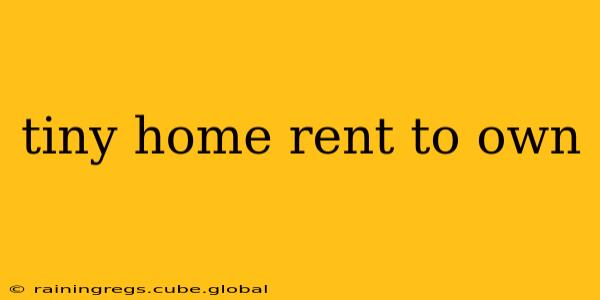The dream of homeownership is often coupled with the daunting reality of high prices and stringent mortgage requirements. For many, the solution might lie in a surprisingly compact package: a tiny home rent-to-own program. This innovative approach offers a unique pathway to owning your own home, but it's crucial to understand the intricacies before you sign on the dotted line. This comprehensive guide explores the benefits, drawbacks, and crucial considerations of tiny home rent-to-own programs.
What is a Tiny Home Rent-to-Own Program?
A tiny home rent-to-own program works similarly to a traditional rent-to-own arrangement, but on a smaller scale. You'll typically pay monthly rent on a tiny home, with a portion of your payments going towards the eventual purchase price. After a predetermined period (often several years), you'll have the option to purchase the home outright. The specifics of the agreement, including the purchase price, rent amount, and length of the contract, are negotiated upfront and detailed in a legally binding contract.
How Does a Tiny Home Rent-to-Own Program Work?
The process typically involves these steps:
- Finding a suitable tiny home and program: Research available properties and programs. Consider factors like location, size, features, and the terms of the rent-to-own agreement.
- Negotiating the contract: This crucial step involves hammering out the details, including the monthly rent, the purchase price (which may include a premium), the length of the rental period, and the conditions for purchasing the home. Thorough review by legal counsel is highly recommended.
- Making monthly payments: Regularly pay the agreed-upon rent, which will include both a rental component and a portion applied towards the purchase price.
- Homeownership: Upon completion of the agreed-upon rental period and fulfilling all contractual obligations, you'll have the option to purchase the home.
Is a Tiny Home Rent-to-Own Program Right for Me?
This depends heavily on your individual financial situation and goals. Consider these pros and cons:
Pros:
- Easier access to homeownership: Rent-to-own programs can provide a pathway for those who may not qualify for traditional mortgages. A smaller down payment and less stringent credit requirements can make it more accessible.
- Building equity: A portion of your rent goes directly toward ownership, allowing you to build equity over time.
- Opportunity to test the waters: Living in a tiny home for a set period allows you to experience the lifestyle before committing to full ownership.
Cons:
- Higher overall cost: Rent-to-own programs often involve a higher overall cost compared to a traditional mortgage, due to the built-in premium.
- Risk of losing investment: If you fail to meet your contractual obligations, you could lose the money you've already invested.
- Limited flexibility: Once the contract is signed, you have less flexibility compared to renting a conventional property.
What are the Common Terms and Conditions in a Tiny Home Rent-to-Own Contract?
A typical contract will include:
- Purchase price: The final price you'll pay to own the tiny home.
- Monthly rent: The regular payment you'll make, including the portion applied to the purchase price.
- Length of contract: The period you'll rent before having the option to buy.
- Conditions for purchase: Details about the purchase, such as required inspections and financing options.
- Default provisions: What happens if you fail to meet your payment obligations.
What are the Potential Risks of Tiny Home Rent-to-Own?
- Hidden fees: Scrutinize the contract carefully for any hidden fees or charges.
- Unrealistic expectations: Don't underestimate the commitment required. Regular payments are crucial.
- Property condition: Conduct a thorough inspection before signing the contract to avoid unexpected repairs.
How Can I Find a Reputable Tiny Home Rent-to-Own Program?
Thoroughly research potential programs and sellers. Check reviews, obtain references, and ensure the contract is fair and transparent. Consulting with a real estate attorney is highly recommended.
What are the financing options available for buying out a tiny home in a rent-to-own program?
Financing options will depend on the specific program and your financial situation. Some programs might offer financing, while others may require you to secure a loan independently. Exploring your options with a mortgage broker can prove beneficial.
What are the legal implications of a tiny home rent-to-own agreement?
It's crucial to have the agreement reviewed by a qualified legal professional to ensure you understand all the terms and conditions, your rights, and your obligations. This will protect your interests and prevent misunderstandings.
This detailed guide offers a comprehensive overview of tiny home rent-to-own programs. Remember, diligent research and careful consideration are vital before embarking on this path to homeownership. Consulting with financial and legal professionals can significantly increase your chances of a successful and rewarding experience.
